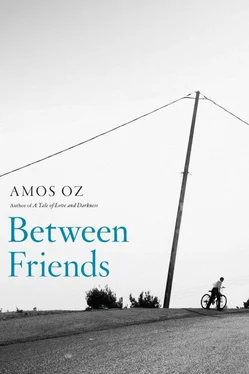Two weeks ago, Arthur wrote to her saying that he was going to ask Yotam to come and study mechanical engineering at the Milan Polytechnic Institute. He could live with him and Lucia, they had a large home, and he, Arthur, would pay the boy’s tuition and all his living expenses for his four years at the Institute. Tell them on the kibbutz, Arthur wrote, that I’m saving them a lot of money, or they would have to pay Yotam’s tuition and living expenses when it’s his turn to go to college. With the money I save them, they can send someone else to college. And I’ll invite you too, Henia, to come and visit us once or twice a year.
Once, when Yotam was about six, Uncle Arthur came for a visit, on a Haganah motorcycle, and took him for a ride around the kibbutz. How surprised and envious the other children were when they saw him sitting pressed up against his uncle’s strong body, which gave off a pungent, pleasing smell of pipe tobacco when he held him high in the air and said, “Grow up, grow older, be a soldier.”
Yotam was short, tanned and muscular, broad and sturdy, and his roundish head was topped with hair clipped almost to the roots. He had large, very strong hands. He wasn’t good-looking, and when he was spoken to, a faint expression of wonder spread across his face, as if all the words directed at him surprised or frightened him. A missing front tooth, along with his wrestler’s body, made him look belligerent. But contrary to his appearance, Yotam was a shy young man who spoke little, though from time to time he would suddenly come out with a strange, sweeping statement. On the kibbutz, we called him a philosopher because he once emerged from his silence to claim that man has the basic nature of a freakish animal. Another time, at dinner in the kibbutz dining hall, he said that there were more similarities than differences among humans, animals, plants, and inanimate objects. Roni Shindlin’s response to that, given behind Yotam’s back, was that Yotam Kalisch himself really did bear a slight resemblance to a box or a packing crate.
Yotam had been discharged from the army about six months before his Uncle Arthur’s letter and went to work in the orchards. He wasn’t an outstanding worker; there was a certain languor about him. But his coworkers were impressed by his great physical strength and his willingness to work overtime when necessary. When Uncle Arthur’s letter arrived from Italy, Yotam delayed for two or three days, then finally said to his mother in a low voice, as if admitting guilt for some crime, “Yes, but only if the kibbutz agrees.”
Henia said, “It’ll be hard to get a majority at the meeting. There’ll be a lot of jealousy and resentment.”
Roni Shindlin said to his regular tablemates in the dining hall, “What a shame that rich uncles in Italy are in such short supply these days. It wouldn’t hurt if we each had one. Then we could send all the young people to college at his expense. Problem solved.”
And David Dagan, the teacher, said to Henia that he would oppose Yotam’s request for three reasons. First, on principle, every young man and woman has to work on the kibbutz for at least three years after the army and only then can the possibility of college be considered. Otherwise, there won’t be anyone left here to milk the cows. Second, such gifts from rich relatives strike a serious blow against the principle of equality. Third, the young people who leave to attend college should study something that will benefit our society and our enterprises here on the kibbutz. What do we need a mechanical engineer for? We have two mechanics working in the garage and they’re doing just fine without a certified professor there.
Henia tried in vain to soften David Dagan, citing young people’s innate right to self-fulfillment. David Dagan chuckled and said, “Self-fulfillment, self-fulfillment, it’s nothing but self-indulgence. Just give me a minute so we can set things straight: either every one of us, without exception, gives an eight-hour workday six days a week or there’ll be no kibbutz here at all.”
That evening, Henia went to see Yoav Carni, the secretary, in his apartment and told him that she had to put all her cards on the table: if the kibbutz meeting on Saturday night didn’t let Yotam accept his Uncle Arthur’s invitation to go to college in Italy, there was a chance he might go anyway, without their permission. “Do you really want to lose him? Don’t any of you care at all?” This ultimatum was entirely Henia’s idea because Yotam had, of course, told her the opposite, that he would accept Uncle Arthur’s invitation only if the kibbutz agreed.
Yoav Carni asked, “Why did you come here, Henia? Why doesn’t Yotam himself come to talk to me?”
“You know Yotam. He’s a boy who keeps things close. Introverted. He has inhibitions.”
“If he’s brave enough to go to college in Italy without knowing the language and without friends, he should have enough courage to come here himself and not send his mother.”
“I’ll tell him to come and see you.”
“Okay, good. But I’m afraid he won’t hear from me what he wants to hear. I’m against private initiatives and private funds in the life of the kibbutz. Yotam has to wait his turn, and when it comes, the Higher Education Committee, along with him, will decide where and how he goes to college and what he studies. When the time comes, if his uncle wants to help pay expenses, we’ll discuss it and take a vote. That’s our way. Those are the rules. But tell him to come and see me and I promise to listen to him and then explain these things patiently. Yotam is a sensitive, intelligent young man and I’m sure he’ll understand our position and withdraw his request of his own free will.”
The faint, oppressive smell of plants sweating in the blistering heat lay over the kibbutz lands. The hot, dusty air was stagnant. The ficus and pine trees, the myrtle bushes, the bougainvillea and ligustrum shrubs, the lawns and rose beds — all breathed heavily in the darkness under the dense, blazing mass. A gust of arid air mixed with the smell of scorched thorns blew down from the hilltop ruins of the abandoned Arab village of Deir Ajloun. Perhaps distant fires were still burning there. At nine at night, without knocking, Henia walked into Yotam’s room, which was in one of the sheds in the discharged soldiers’ housing area, and told him that the meeting on Saturday night was probably going to reject his request. They’d most likely decide to tell Uncle Arthur that if he wanted to support the education of Kibbutz Yekhat’s youth, he was invited to contribute to the kibbutz college fund.
“They’re fanatics, all of them,” Henia said. “They’re jealous. Resentful.”
Yotam said, “Okay.” Then added, “Thank you.” After a brief silence, he said, “You shouldn’t have spoken to them, Mother. It’s too bad you did. Mechanical engineering isn’t really for me, anyway.”
The night was still gravid and dusty. The thick, inert desert air pressed down on everything. Mosquitoes buzzed around them and two or three moths slammed into the naked light bulb dangling from the ceiling. The tin roof radiated the heat of the day into the room and no coolness came in at the open window. Yotam’s room was furnished with an iron bedstead, a wooden table painted green, a curtain-covered crate used as a closet, a straw floor mat, and two wicker stools. An electric fan stood in a corner of the room, stirring the air to no avail. Visible through the window were the hills that concealed the ruins of Deir Ajloun. Both mother and son were bathed in sweat. The stubble on Yotam’s head, his muscular shoulders, his tanned, broad back in a blue singlet, and his missing front tooth lent him an air of coiled violence he didn’t possess. His almost unnaturally large hands rested heavily on his naked knees. He sat on the unmade bed and his mother on one of the stools. Yotam offered her cold water from the jug that stood under the window, but Henia refused with a dismissive wave of her hand, as if she were swatting a fly.
Читать дальше












